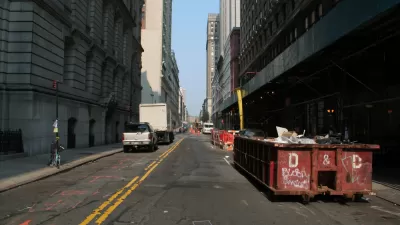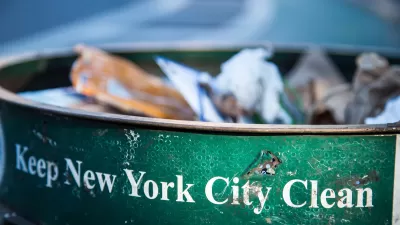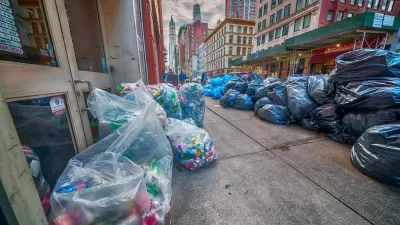Sanitation workers must manually collect bags from containers blocked by parked cars, slowing a process that is meant to be safer and more efficient.

Despite a recent program to containerize garbage, New York City sanitation workers still have to contend with parked cars blocking trash containers, forcing them to continue manually collecting garbage bags from the city’s sidewalks.
As Kevin Duggan explains in Streetsblog NYC, “The agency is equipping some of its roughly 2,000 rear-loaders with tippers to mechanically hoist the newly mandated wheelie bins, but because they're on the sidewalk, these upgrades will run up against the steel wall of the roughly 3 million parking spaces the city provides to motorists largely at no cost.”
The city’s new containerization program is part of the effort to reduce the rampant rat population. Next year, the Sanitation Department will begin installing street-side stationary containers for buildings with 31 or more units, while smaller buildings can choose stationary containers or mobile bins.
In addition to keeping the city’s streets cleaner, containerization can also reduce the physical impact on sanitation workers, who haul “as much as 20 tons per shift in some neighborhoods.” According to Duggan, “The answer to this issue is clawing back space from cars for better uses, advocates said, urging Sanitation officials to work with the Department of Transportation to mark sections of the streetscape to wheel out trash.”
FULL STORY: Cars Still Get in the Way of Containerized Trash Pickup

Trump Administration Could Effectively End Housing Voucher Program
Federal officials are eyeing major cuts to the Section 8 program that helps millions of low-income households pay rent.

Planetizen Federal Action Tracker
A weekly monitor of how Trump’s orders and actions are impacting planners and planning in America.

Ken Jennings Launches Transit Web Series
The Jeopardy champ wants you to ride public transit.

Washington Legislature Passes Rent Increase Cap
A bill that caps rent increases at 7 percent plus inflation is headed to the governor’s desk.

From Planning to Action: How LA County Is Rethinking Climate Resilience
Chief Sustainability Officer Rita Kampalath outlines the County’s shift from planning to implementation in its climate resilience efforts, emphasizing cross-departmental coordination, updated recovery strategies, and the need for flexible funding.

New Mexico Aging Department Commits to Helping Seniors Age ‘In Place’ and ‘Autonomously’ in New Draft Plan
As New Mexico’s population of seniors continues to grow, the state’s aging department is proposing expanded initiatives to help seniors maintain their autonomy while also supporting family caregivers.
Urban Design for Planners 1: Software Tools
This six-course series explores essential urban design concepts using open source software and equips planners with the tools they need to participate fully in the urban design process.
Planning for Universal Design
Learn the tools for implementing Universal Design in planning regulations.
Heyer Gruel & Associates PA
Ada County Highway District
Institute for Housing and Urban Development Studies (IHS)
City of Grandview
Harvard GSD Executive Education
Toledo-Lucas County Plan Commissions
Salt Lake City
NYU Wagner Graduate School of Public Service





























